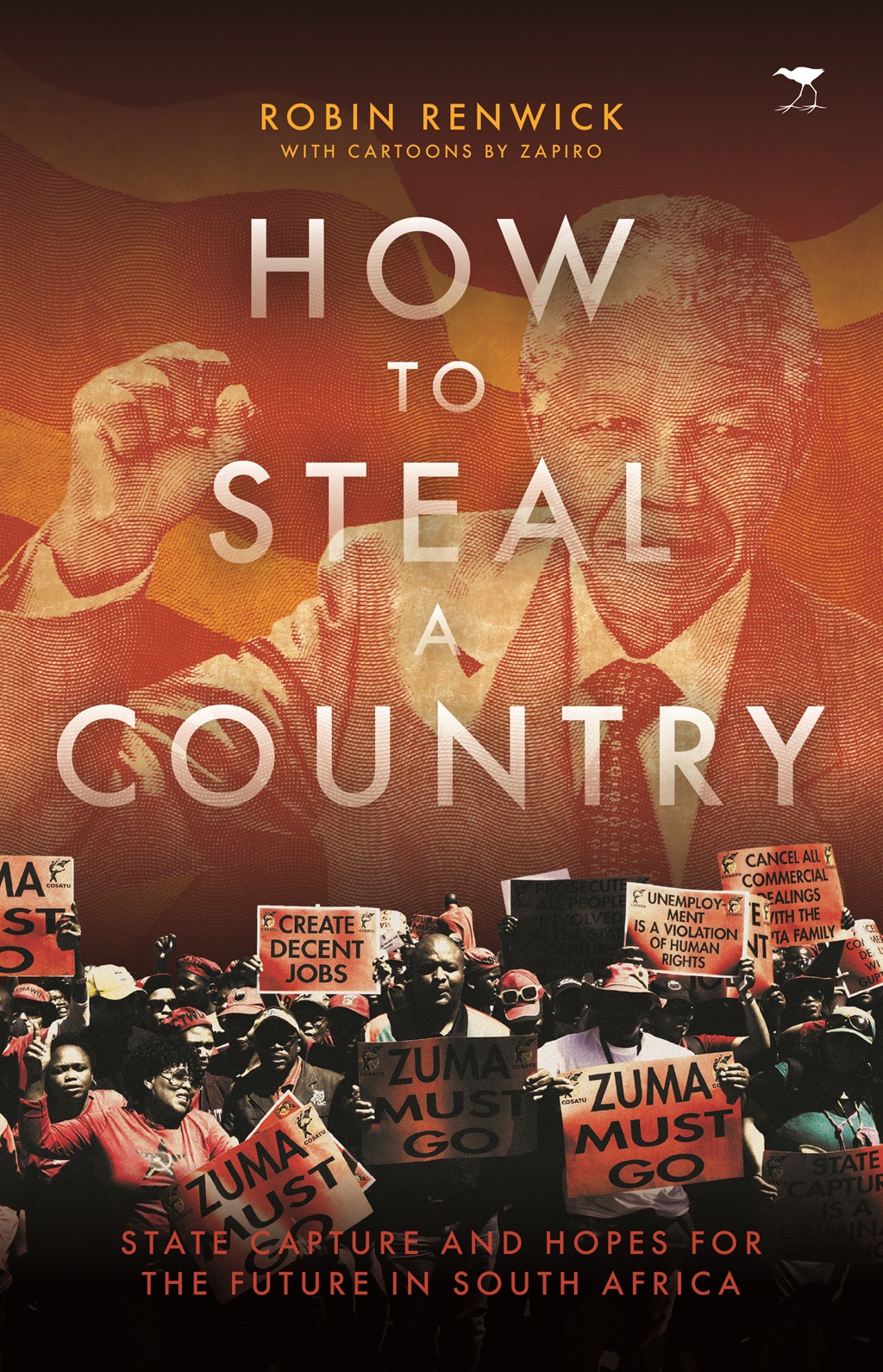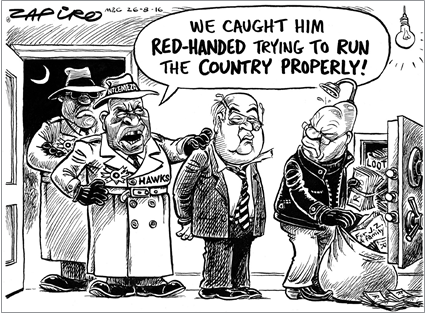
How To Steal A Country
by Lord Robin Renwick
With cartoons by Zapiro
Jacana Media
336 pages
R280
The official media launch of How To Steal A Country, by Lord Robin Renwick took place on Tuesday morning in Johannesburg.
Lord Renwick, who was the UK ambassador to South Africa during the period leading to the release of Nelson Mandela, said of the book: ‘It is an incredible story which pays tribute to people like Thuli Madonsela, Pravin Gordhan, civil society and judges and other organisations who have helped to fight against corruption.’
In this extract, Renwick explores former finance minister Pravin Gordhan’s role in standing up against injustices which were meted against him.
A distasteful campaign
To general astonishment and the dismay of the South African business community, the elections were followed immediately by a clash between what many by now had come to regard as the reputable and disreputable elements of the ANC.
Pravin Gordhan and the former senior officers of the South African Revenue Service were summoned by the head of the Hawks, General Berning Ntlemeza, to make a statement in relation to the Hawks’ investigation into their setting up the supposedly illegal investigative unit within the revenue service.
Gordhan refused to do so, on legal advice.
A letter from South African business leaders denounced these “sinister manoeuvres”, declaring that the investigation “lacked credibility and legitimacy” and threatened South Africa’s investment grade status.
What in effect was happening was a reversion to the methods employed under PW Botha, when a group of securocrats with no understanding of or interest in the economy, under the direct authority of the president, pursued against all comers the only objective of any interest to them, which was to maintain control by all means necessary and at any cost.
Meanwhile, the Gupta-controlled Tegeta mining company sought an injunction to prevent the Treasury publishing its investigation into the licences awarded to Tegeta by Eskom.
The deputy president, Cyril Ramaphosa, denounced the “distasteful campaign” against Gordhan.
Zuma, however, declared that he had no power to stop the investigation into Gordhan, then staged another coup by seeking himself to take over the committee on the state-owned enterprises which Ramaphosa had been chairing.
As the veteran anti-apartheid commentator Allistair Sparks pointed out in a valedictory column shortly before his death: “This unschooled man has pronounced himself commander in chief of the economy. In doing so, he has grabbed control of all the big state feeding troughs on which the ‘tenderpreneurs’ have been engorging themselves since he came to power seven years ago. There will now be no restraining them.”
Disdain and contempt
Zuma was not invited to attend the funeral at this time of the former ANC minister, the Reverend Makhenkesi Stofile.
It was, however, attended by many of the old guard of the ANC and addressed by Sipho Pityana, formerly the ANC-appointed director-general of foreign affairs, detained and tortured by the apartheid security police, now a prominent business leader.
He declared that the ANC’s setbacks were self-inflicted. They had ceded the moral high ground.
“The president of our country takes every opportunity to show disdain and contempt for our constitution,” he added.
They were falling over each other to steal from the poor. Were the latter-day ANC leaders of a revolution or thieves and looters? There was no accountability.
“Our movement is captured” and consequently the government was captured. Without new leadership, they would lose the next election.
On August 26 2016, Gordhan was reported as telling Treasury staff that he was prepared to die to save the country from thieves.
This was part of a bigger political battle. They should not be surprised if he and his deputy, Mcebisi Jonas, were removed.
He added that he was being persecuted for doing his job by investigating contracts with companies owned by the Guptas.
Cyril Ramaphosa talked of a government at war with itself. FW de Klerk declared that the way in which black economic empowerment policies were being implemented would cause many white South Africans to emigrate.
As the SACP members of the government also were threatened with dismissal because of the party’s criticisms of corruption, their deputy secretary-general and deputy minister of public works, Jeremy Cronin, said that they would rather leave the government than remain silent in such circumstances.
They denounced the attacks on Gordhan as politically motivated because of his stand against corruption and expressed scepticism as to whether the Guptas could find any buyers for or really intended to sell their thinly traded and overvalued assets.
The veteran ANC and SACP anti-apartheid activist, Raymond Suttner, voiced concern that the only way an unreformed ANC could hold on to power would be by illegal means, which they were capable of employing.
Meanwhile, with Zuma intervening to chair the ministerial committee dealing with the state enterprises, Gordhan was unable to dislodge Zuma’s closest female crony, Dudu Myeni, from her disastrous chairmanship of South African Airways, though he did achieve other changes to the board.
The company had been kept afloat by R14 billion of government guarantees, plus now another R5 billion. It also had been fined for anti-competitive practices in its efforts to put rival internal airlines out of business.
The Zuma securocrats continued the war against Gordhan. At a time when the Guptas were cash-strapped, the media were reporting that the head of Sars, Tom Moyane, had intervened personally to authorise the payment to them of a R70-million VAT refund.
They were reported to have asked for this to be paid offshore, though this was ultra vires for Sars.
A prosecuting fiasco
Shaun Abrahams’s attempt to dislodge Gordhan for supposedly illegally approving the pension settlement for Ivan Pillay backfired badly, as a host of respected former ANC leaders, including former President Kgalema Motlanthe, the surviving Rivonia triallists Ahmed Kathrada, Andrew Mlangeni and Denis Goldberg and many others rallied to Gordhan’s support, threatening to attend the court hearing.
Legal experts pronounced the case brought against Gordhan to be politically motivated.
It then transpired that a senior Sars employee, Vlok Symington, claimed to have been held hostage and physically manhandled in the presence of the Hawks investigator Brigadier Xaba for refusing to hand over a memorandum in which he expressed ethical objections to the case against Gordhan.
Two days before the case was due to be heard, Abrahams abruptly withdrew the charges, rather than face a display of support for Gordhan and a fiasco in court.
This caused a spectacular falling out between Abrahams, as head of the National Prosecuting Authority, and Ntlemeza, head of the Hawks’ investigators and Zuma’s chief attack dog against Gordhan.
Ntlemeza wanted indignantly to know why the case against Gordhan had been dropped. Abrahams responded furiously that the Hawks had withheld from him the evidence from Symington.
After this fiasco, neither Abrahams nor Ntlemeza resigned.
Abrahams received a letter from Zuma asking him to show cause why he should continue in office, but this turned out to be purely pro forma. Ntlemeza’s response was to redouble his efforts to charge Pravin Gordhan.
The looting of Eskom
At a special late-night meeting after the South African banks declined to do more business with the Guptas because of concerns about over 70 questionable transactions, Eskom under Brian Molefe had agreed to bail them out by handing over the R586-million “pre-payment” to the Gupta coal company Tegeta.
It subsequently was revealed by the chief financial officer, Anoj Singh, that with no Treasury authority, Eskom also had given them a R1.6 billion guarantee, intended to help the Guptas to overcome the withdrawal of their banking facilities, while acquiring Optimum with the connivance of Eskom management.
Eskom, in defiance of the Treasury, proceeded to start issuing the first contracts for “consultancy services” for the nuclear programme, with Molefe claiming, contrary to all the evidence, that this could be financed without recourse to government funding, despite Eskom’s critical dependence on government guarantees to fund its burgeoning R360-billion debt.
Molefe’s successor as acting chief executive of Eskom, Matshela Koko, endorsed this absurd claim.
Despite his having denied this on live television, his
signature also appeared on the document approving the pre-payment to Gupta-owned Tegeta, to help them to buy Optimum.
In January this year, amid huge controversy, following an internal disciplinary hearing, he was reinstated in a senior position in Eskom, only for this to be reversed by the new leadership of Eskom.




 Publications
Publications
 Partners
Partners










